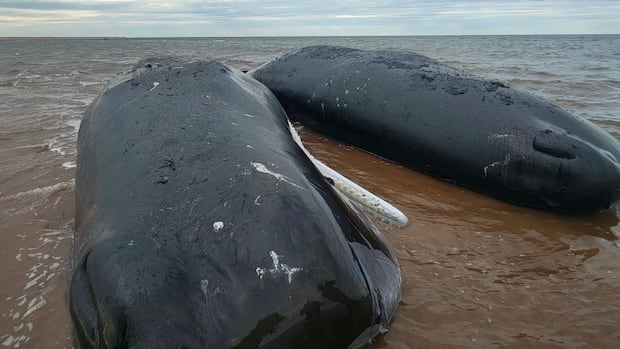PEIThe third of three sperm whales stranded off P.E.I.’s North Shore has died, a day after the first two massive creatures were confirmed to have perished, according to the executive director of the Marine Animal Response Society. Group had chosen to let nature take its course, ‘but it’s still pretty heartbreaking’Carolyn Ryan · CBC News · Posted: Sep 30, 2025 7:06 PM EDT | Last Updated: 1 hour agoTwo large sperm whales were confirmed dead Monday after becoming stranded on P.E.I.’s North Shore. The third young male is now confirmed to have succumbed as well. (Marine Animal Response Society )The third of three sperm whales stranded off P.E.I.’s North Shore has died, a day after the first two massive creatures were confirmed to have perished, according to the executive director of the Marine Animal Response Society. “What was decided yesterday, in the sense of the best thing for the animal and obviously with human safety in mind, was to let … nature take its course, let the animal pass peacefully,” Tonya Wimmer said in an interview with CBC Radio’s As It Happens on Tuesday. “But it’s still pretty heartbreaking.”The three young male whales were first noticed Saturday night on the ocean side of a small chain of islands close to Hardys Channel, near East Bideford in western P.E.I. Each weighed between 15 and 20 tonnes, Wimmer estimated. “There’s only a few handful of options that can even be considered with animals this large,” she told As It Happens. “The usual tools we may have to be able to refloat or move animals aren’t necessarily available to us.”WATCH: Trio of sperm whales in bad shape off P.E.I.:Sperm whales remain stranded off P.E.I.’s North ShoreWildlife officials are still trying to determine the state of three sperm whales that are stranded just off P.E.I.’s coast. Fisheries and Oceans Canada says it’s monitoring the situation with local partners, and reminds people to stay away from the stranded animals. CBC’s Tony Davis has more.She said the first instinct for many people not used to dealing with whales would be “to put a rope around the tail and pull. And that’s actually one of the worst things that you can do for these animals of any size.”Wimmer said sperm whales are usually found far offshore, in waters at least 800 metres deep.They are known for their diving abilities, using them to feed on deepwater squid and other prey near the sea floor.Tonya Wimmer, shown in a file photo, said the Marine Animal Response Society will now try to arrange a necropsy on at least one of the sperm whales. (Sheehan Desjardins/CBC News)”For them to be in extremely shallow waters was a … bit of a red flag because this really is an area they shouldn’t be in, in terms of how they work and function and use the habitat and what they eat,” Wimmer said.She said the next step is to figure out whether a necropsy can be performed on at least one of the marine mammals, to see if there might have been a physical reason for their behaviour, or “if they were all fairly healthy and somehow just got disoriented and went the wrong way.”With files from As It Happens
Response group confirms 3rd sperm whale has died off P.E.I.’s North Shore











